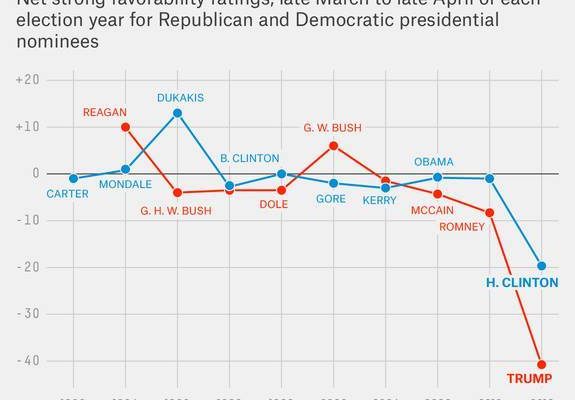Many undergraduate students intending to vote on Nov. 8 will be voting in their first presidential election. Incidentally, the current election cycle is characterized as historic for reasons such as the record-breaking unfavorability ratings of both candidates, Paul Ryan’s — the Republican Speaker of the House — lack of support for his own party’s nominee and the effects of social media.
Due to the abundance of information produced daily, many articles and their headlines aim to evoke emotions in order to generate views, which generate revenue. Bias potentially stems from that method. According to Dr. William M. Abbott, Associate Professor of History, “Only a small percentage of U.S. electorate studies the candidates and issues thoroughly; therefore soundbites and brief stories in the popular media are extremely influential. The media is not interested in educating the American public; the media is interested in making money.”
Senior Jasmine Raghunandan also gave the media and publicity credit for shaping the perception of the candidates, Donald Trump and Hillary Clinton. “I think she comes across as more political and even ‘politically correct,’” expressed Raghunandan. “That’s the image I get from television, social media and the debates.”
Both Trump and Clinton have blemishes on their financial records. Throughout the 1990s, Trump’s casino ventures repeatedly fell millions of dollars into debt, according to The New York Times article entitled, “How Donald Trump Bankrupted His Atlantic City Casino, But Still Earned Millions.”
Slate, an investigative blog about political controversies, posted an article titled “Donald Trump Admitted He Didn’t Pay Taxes — And Then Blamed Hillary,” detailing how using corporate loopholes allowed him to dodge taxes, a typically criminal offense.
The Wall Street Journal shed light on Trump’s failure to compensate certain contractors for their services.
Meanwhile, Clinton personally benefited from the Clinton Foundation, a non-profit organization. Although she never received direct payment, particular conflicts of interest worked greatly in her and Bill Clinton’s favor according to an article entitled, “Democrat Pundit: The Clintons ‘Take No Salary’” from Politifact. Politifact also discussed how in 2001, Clinton took over $100,000 worth of furniture and ornaments from the White House without permission, which the White House later forced her to return.
As Secretary of State, Clinton’s foreign policies created a power-vacuum in the middle-east which led to ISIS’ rise to power, according to the article “Hillary Clinton’s Foreign Policy…” in Inquisitr.
The Breitbart article ‘Hillary Clinton’s Criminality In Benghazi’ pointed out how she failed to protect U.S. Embassy Workers during the Benghazi Attacks. She also supported NAFTA, which led to American companies outsourcing their labor. Many Americans resultingly lost their jobs due to this the article “Hillary Clinton’s Stand on NAFTA” from PRI reported.
On the other hand, Donald Trump has no experience in public office at all. Without any prior political experience, he managed to discredit NATO, only to retract his opinion in the midst of backlash, according to the CNN article “Trump Would Break Sharply With US Foreign Policy Tradition.”
ThinkProgress compiled a series of quotes showing Trump’s inclination to use nuclear weapons, titled “9 Terrifying Things Donald Trump Has Publicly Said About Nuclear Weapons.”
Despite Trump’s controversial attitude, Clinton’s career includes notable incidents of dishonesty. First, her use of a private server threatened U.S. national security. She escaped punishment and charges of treason because of her ties with James Comey, director of the FBI according to an article by American Thinker. The Federalist pointed out how, in this case, her status as a career politician unconstitutionally positioned her above the law.
The Chicago Tribune’s ‘DNC Betrayed Bernie Sanders And The Rest Of America’ describes how Clinton pulled strings with Debbie Wasserman-Schultz, chairwoman of the Democratic National Committee, where she was conspiring to sabotage Bernie Sanders’ run for office. These actions have caused her to lose the trust of Sanders’ supporters according to an article by the Washington Post.
Many students agree that temperament is an important factor when choosing to vote, and that Hillary’s temperament bests Trump’s.
Freshman Christina Judd, for example, remarked “I think he’s very bold and brash and doesn’t have a good temper,”
“I think [Hillary] lacks, sometimes, emotions and that she’s trying to be as professional as she can be,” Judd continued.
Judd is not alone in this judgement; Dr. Abbott added in, “Trump has alienated so many constituencies that many Republicans who wish to be elected to Congress are distancing themselves from him.”
These opinions reflect certain truths: Trump has displayed a lewd, misogynistic attitude towards women. Yet another compilation of Trump-quotes, ‘The History Of Donald Trump’s Insults To Women,’ by Fortune magazine references misogynistic remarks of his.
Next, Trump’s prior ownership of the Miss Universe beauty pageant inherently means that he has profited from the sexual objectification of women.
Senior Paola Garcia particularly found Secretary Clinton’s personality better fitting: “Hillary wins, Donald Trump is a ‘freakin’ mess in every single aspect… I think temperament is a big factor because I don’t want an [expletive] as a president.”
This reputation of Trump’s better enabled Clinton to run as the ‘women’s candidate.’ Ironically, Clinton disempowered victims whom her husband had previously sexually assaulted as to not disadvantage her career. In settlements, the Clintons paid money to victims in exchange for their silence according to an article by The Political Insider.
The policies enacted by those in office affect our lives in real, tangible ways. Therefore, it is important to stay informed about those on the ballot.
Dr. Abbott feels that open-mindedness is important, “I think that the hypersensitivity shown by too many people, on both sides, has gotten to a point at which the right never-to-be-offended has often destroyed the possibility of civil discourse… [it] is the unspoken threat in many places, including university campuses, and it is killing the free exchange of views.” If Americans fail to properly educate themselves before voting, the wrong candidate may enter office and make big decisions–potentially the wrong ones.


Leave a Reply